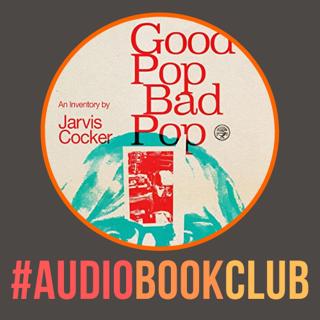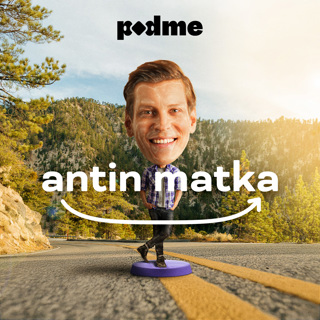
'The Secret of Secrets' by Dan Brown
On this episode of #AudioBookClub: THE SMELL OF DEATH! Steve Phillips and Matthew Layton present #AudioBookClub, a weekly podcast that reviews and recommends audiobooks. On this week's episode we are casting an ear over the first new novel in eight years from the author of The Da Vinci Code The Secret of Secrets Robert Langdon Book 6 A: Dan Brown N: Paul Michael L: 22 hrs and 50 mins R: 09-09-25 P: Penguin Audio #Literature #Fiction Please get involved in the conversation @SteveKPhillips and @WhingeingPom #AudioBookClub.net #AudioBookClub on facebook, instagram, Bluesky or X On the next episode of #AudioBookClub: Clown Town Slough House, Book 9 A: Mick Herron N: Sean Barrett R: 11-09-25 L: 12 hrs and 6 mins P: Baskerville #Mystery #Thriller #Suspense
21 Syys 38min

'A Particularly Nasty Case' - by Adam Kay
On this episode of #AudioBookClub: The first novel from international best-selling author - and former junior doctor - Adam Kay. Steve Phillips and Matthew Layton present #AudioBookClub, a weekly podcast that reviews and recommends audiobooks. On this week's episode we are casting an ear over 'A Particularly Nasty Case' - by Adam Kay A Particularly Nasty Case A: Adam Kay N: Andy Serkis R: 28-08-25 L: 10 hrs and 9 mins P: Orion #Literature #Fiction Please get involved in the conversation @SteveKPhillips and @WhingeingPom #AudioBookClub.net #AudioBookClub on facebook, instagram, Bluesky or X On the next episode of #AudioBookClub: The Secret of Secrets Robert Langdon Book 6 A: Dan Brown N: Paul Michael L: 22 hrs and 50 mins R: 09-09-25 P: Penguin Audio #Literature #Fiction
8 Syys 54min

'Entitled' - by Andrew Lownie
On this episode of #AudioBookClub: 'Their trousers all fell down!" Steve Phillips and Matthew Layton present #AudioBookClub, a weekly podcast that reviews and recommends audiobooks. On this week's episode we are casting an ear over Andrew Lownie's joint biography of The Duke and Duchess of York. Entitled The Rise and Fall of the House of York A: Andrew Lownie N: Andrew Lownie R: 14-08-25 L: 11 hrs and 40 mins P: William Collins #Biographies & #Memoirs Please get involved in the conversation @SteveKPhillips and @WhingeingPom #AudioBookClub.net #AudioBookClub on facebook, instagram, Bluesky or X On the next episode of #AudioBookClub: A Particularly Nasty Case A: Adam Kay N: Andy Serkis R: 28-08-25 L: 10 hrs and 9 mins P: Orion #Literature #Fiction TRANSCRIPT Steve Phillips and Matthew Layton discuss Audiobook Club on this podcast Matthew Layton: Audiobook Club with Steve Phillips and Matthew Layton. Steve Phillips: On this episode of Audiobook Club. The grand old Duke of York was once a very naughty boy. Speaker C: Andrew quickly grew into the classic spoil brat. Aware of his high rank from an early age. Arrogant and overbearing, he would order staff about and according to one member of staff, be a bloody nuisance. Even the Queen described him as a bit of a handful. He was fond of practical jokes, hiding knives and forks when a footman was laying the table, tying the shoelaces of centuries, teasing his grandmother and reputedly an Anglican bishop at Balmoral as well, with a whoopee cushion, putting itching powder into his mother's bed, turning the aerial at Buckingham palace so she could not watch the racing at sundown, and putting washing up liquid in the palace pool. A valuable silver tray was used as a toboggan for sliding down palace stairs, and he would pedal furiously up and down the long red carpeted corridors on his tricycle. Almost from the beginning, he felt a strong sense of entitlement with fawning staff, lavish homes, chauffeured cars, and showed himself to be wilful, exuberant, gregarious, undisciplined and aggressive, and possessed of a limited attention span. Evelyn Muir Bell, who worked at Windsor, between 1973 and 1995, remembered him as the most troublesome royal, a tiresome little shit. Matthew Layton: Audiobook Club with Steve Phillips and Matthew Layton. Steve Phillips: Hello and welcome to Audiobook Club, the podcast about audiobooks that loves pizza express and sports. Sweats like a pig. Matt. Hi, Matt. Matthew Layton: Hello, Steve. I love making you say things. Steve Phillips: Yes. Yeah, I just sight read that. Matthew Layton: Still fun. Well, welcome back. Steve Phillips: yeah, well, welcome, welcome back, welcome back. Here we are, Season three. I did want to say a welcome back to Audiobook Club, where this week we're going through a lot of princely sums. But you came up with something much more highbrow than I ever did. Matthew Layton: yes, well, that's my job, isn't it? No, it's more low brow. I'm nothing but, but filthy low brow and smutty. oh, speaking of which, that leads me, on to another little clip I prepared that I didn't think I was gonna get the chance to play, but write up your strasse. Here is a, list of the guests from the wedding of the Duke and Duchess of York, or Prince Andrew and Sarah Ferguson, as she was until that point. that I thought you, you might enjoy. Speaker C: Almost 2,000 guests had filled the abbey, among them, Nancy Reagan, the racing driver, Jackie Stewart, the comedian Billy Connolly and his actress wife Pamela Stevenson. Elton John and his wife Renata, Michael and Shakira Kane, Barry Humphries, the American comedian Joan Rivers and the actor Anthony Andrews as well as foreign royals, aristocrats and the great and the good. Matthew Layton: How's that for Elton John and his wife Renata? That dates it, doesn't it? Steve Phillips: That's going back a little bit, isn't it? The Rise and Fall of the House of York by Andrew Lowney Well you may have noticed there dear listener, that this week we're casting an ear over entitled the Rise and Fall of the House of York by Andrew Lowney, narrated by the author, came out a couple of weeks ago as we record it's a stonking 11 hours and 40 minutes and published by William Collins and ah, this is fair to say, has set the. Well has set the. The audio book club world alight. It's the bestseller at the minute and and I'd be very remiss if we didn't cast an ear over the House of York in this week's episode. Matthew Layton: It came to my attention because a couple of weeks ago, just as the book was being released, I think the Release date was 18th of August. I'll have a look at that in a minute and confirm. but Andrew Lanley who I'd never heard of before was on many of the things that I listen to basically tearing the Duke of York a new one. And you and I having worked at the BBC, we know how these things work. If you want to plug your book you would better on Radio 5 live or BBC Breakfast or you know a newsy type programme. You've got to have a newsline. And of course the Epstein story that refuses to go away from Trump is linked to this. so the timing must have been magnificent For Lonely and his publishers that was great. So that's why I was drawn to the book. It didn't turn out to be what I expected but yeah, do expand. Steve Phillips: Do you want to expand on that now or should we park that for a little bit? Matthew Layton: Let's park that for a little bit but let's start. Chelsea Bridge is doing a biography about Duke and Duchess of York So this whole book is about the Duke and Duchess of York and their story from And even it tells both of their childhood stories as you heard from that clip in the beginning. What I've done Steve, is I'm going to ask you a question and it is her first question is have you read the book? Steve Phillips: yes, pretty much. Matthew Layton: Okay, yeah, that doesn't matter. It's almost better if you're not. So I put in the script if you scroll down to the bit where it says bance, I've given you a little visual guide. Oh, they're all there off the top of your head. What do you think of when you see. Just use it as a tool. Pretend you haven't. Pretend to the listener not giving you basically a four stage crutch. Yeah. What do you think of. We think of Prince Andrew. Steve Phillips: Steve, did you say crutch? Sorry, the line's very bad at the moment. Matthew Layton: Get off with it. Steve Phillips: well, yes, I mean this is. Matthew Layton: Well, no. What do you, what do you think, what do you think when I say Prince Andrew is what I'm trying to ask? Steve Phillips: Well, I think you summed it up in these four pictures. Shall I explain what these four pictures are? Matthew Layton: No. Pretend you haven't seen the four pictures. Steve Phillips: No. Matthew Layton: And, but I'm just giving you a little visual. The four pictures that I put up there do not exist. Just I thought they might remind you of. They might trigger something in your memory and some wise words and perhaps a historical overview or, or you can just describe the pictures. Whichever you want to do really. Steve Phillips: Well, you know me, I'm nothing if not base and simplistic. But yes, essentially, essentially Prince Andrew, the second son of the Queen. Doing a biography about Prince Andrew here. If anyone's, if no one's heard of Prince Andrew, you've come to the right place, I'll explain for you. But yeah, yeah, second son of the Queen and you know, he had a career, well I thought a distinguished career in the Royal Navy. He knocked it out the park in the Falklands and so on, got married to Sarah Ferguson, got slightly unmarried to Sarah Ferguson and then just went absolutely nuts everywhere. And frankly this book turned out, well, I don't know, a book in sort of. It's a game of two halves really, or quarters actually, because it's a double biography of both Sarah and Andrew. and it dives both into the financial sector and the private life sector and the behaviour sector and the financial sector. I don't know about you but, but it just felt like, like five and a half hour reading out of invoices. Matthew Layton: Do you know what? that is exactly where I was going to conclude this episode. But I also remember that not everybody remembers Prince, Andrew the way that we do. In fact, you made my point in that for a British listener, he's ubiquitous. For an American listener who vaguely knows of the royal family and has, has realised that Prince Andrew is linked to the, the Epstein files that supposedly don't exist or do, let's not get into that. For somebody like that, those four images that I sent you would mean nothing. So for me, yeah, you're right. Well, I remember him in a naval uniform going to the Falklands War. And that was about the time of Royal wedding number one, early 80s, where Prince Charles married Diana. About five years later, we had another royal wedding. When I was a kid, I thought these happened all the time. And he married Sarah Ferguson, who, we were told that, and a shiny redhead, you know, beautiful wedding, whatever, big ceremony. And we were told, though, various things. She was, she was a bit common, even though, I mean, I'm pretty posh, but I think she's even posher than me. But the whole idea that a woman who didn't conform to the rules, liked to drink and a smoke and, and, was cheeky. Even though she went to very posh boarding school. Her father played polo and her whole life from this book at that time, seems she doesn't leave the Chelsea, Chelsea or Kensington for about six years, whether it be living. I think she, she had a flat the other side of Battersea Bridge once, but she's always in the poshest parts of town and has ridiculous connections that led to her being in the room. But the weird thing was she was considered a bit too common for the royals. Do you remember that bit? Steve Phillips: Yeah, really vaguely. I was quite young then, I guess, but, But yes, that's what I do remember, the sort of the, the talk around it, but I think that was that at the time, it was very endearing, wasn't it? You know, a bit more. A bit more like the people, despite everything you've just said there. Matthew Layton: Yeah, but, but that was it. I mean, I think we were glad that the, the royal establishment were pissed off because this woman didn't necessarily answer the questions in the prim and proper ways that one would be expected to as a royal. And then after that, Andrew just, you know, he's, he's in the background. He hasn't really done anything iconic, so since flying that helicopter. Hadn't done anything iconic since flying that helicopter and marrying that woman. And the next time he really comes on the map is when the BBC's Emily Maitlis interviewed him on Newsnight about his links to dead paedophile Jeffrey Epstein. And basically he, he thought he'd done all right, but in the cold light of day when the interview aired, it was an embarrassment to the Royal family. He was dismissed from active duty. And, yeah, he, he now lives in disgrace I think that. I think that's a fair up some of how. How we as Brits take for granted that we feel and know about him. But remember, some people will be hearing this for the first time. So. This is the first royal biography that we have reviewed on the podcast So what do you remember when we had trouble, I tried to get people's opinions when I was living in Australia on the book Colditz, and nobody knew what Colditz was. So I think those very iconic moments are something that we take for granted, if you see what I mean. Yeah, that we know. Steve Phillips: Yeah. I mean, these four pictures, you've, you've. You've popped up on here, Navy Marriage, that. The infamous photo that sparks all this stuff. And the interview, the Newsnight interview, really, in terms of the public eye, you didn't often see him being interviewed, but a lot of the royals are like that. the interesting thing about this, this is the very first sort of royal biography that we have reviewed. Matthew Layton: No, incorrect, incorrect. Steve Phillips: Oh, apart from the David Mitchell one. Yeah. The unruly. Matthew Layton: No, no. Well, that. Oh, my God, it turns out we're royalists. no, we did the Duke of Edinburgh's one by Giles Brandreth just after he died. And. And there are bits in this where the same story is being told from a different perspective. And the, the thing that got me, in this book, Andrew Lamley had, there is journalistic rigour, but you and I have been through journalism training. So he spoke, he. He asked for contributions from 3,000 people. According to the preface of the book, he managed to speak to 300 of them. I'm not sure that I agree with the quality of some of his data, but the key moment for me was when he said, and in an open carriage behind the bride and groom on the way to the wedding in 1986, the father of the groom and the stepmother of the bride travelled, together, possibly the first time they'd been together since they had an affair in 1959. Steve Phillips: Wow, I missed that bit. Matthew Layton: I'm glad your reaction to that is the same as mine, because you and I know you can't say if you leave out the allegedly or there was rumoured to and just go, they had an affair in 1959. Even if Brandreth knew that at the time he wrote his Duke of Edinburgh book, and which we recommend it, you can listen back to that episode, if you like. Audiobookclub.net we know you need two independent, verifiable sources before you say something as confidently as that. Steve Phillips: And this interesting thing, right, he's been doing the media rounds pretty Heavily, this author, and I don't think anyone's questioned him on it from, from the interviews I've heard. I have him on the News Agents podcast, for example. Example, where actually, you know, they, they, they really kind of kick the tires, as it were, on his. You know, on the veracity of some of the stuff there. And how can you prove this? And how can you prove that? But no one's really brought up that line at all. Matthew Layton: Well, you know what? I'll tell you why, as confirmed, when we had Jenny Draper, on the show Maverick, her book Mavericks, she said it was really nice on social media. After she said it was really nice to go on a programme where someone had read. Actually read my book. And the difference is, Steve, we actually read the books. Steve Phillips: Yeah. Yeah, you definitely do. Sometimes I run out of road, but you definitely do, mate. Matthew Layton: Well, that's because you have. Steve Phillips: I don't know how you do this, by the way. You do this three or four times, like. Yeah, no, I read it. Yeah, I read it twice. I was. I think it was like 14 hours long. Where did you get. Matthew Layton: Because I have no other life. I claim I'm retired, but I'm actually unemployed. Steve Phillips: And that's dedicated to the books. Matthew Layton: And that's how we are, number 42 in the top 100 UK book podcast. Steve Phillips: Yeah, I saw the rating. I'm not happy about that. What happened there? Well, we haven't been around for a little while. It's probably it. They had. They tend to go on long sabbaticals in between seasons. Matthew Layton: They lose their mojo. Leighton has gone off for another one of his, spiritual treks, microdosing mushrooms and wandering around the desert again. He'll be back in about September. It's my right as an Australian man to go walkabout. Steve Phillips: Absolutely right, mate. Till the water bill arrives. Quite right, yeah. Matthew Layton: Three step process. Steve Phillips: Yeah, Three steps. Andrew Lowney has one of those surnames that you can pronounce incorrectly Matthew Layton: We started talking about the author and I think the author is going to be, I've got a lot to say about him. I think you. From what you said earlier, you have too, and I think it's the same thing. Steve Phillips: Yeah, indeed. I mean, yeah. Do you want to give us a lowdown on low. Down on, lounge? I don't. It's. Again, this has been. It's been quite different. He said his surname for an hour. He's got one of those surnames that you can pronounce pronounced, very wrongly or very correctly. Is it loudly or loney? Matthew Layton: yes, you've, said that now. And you may Be worried. But I listened to him loads of times and I think he said Andrew Lowney. That's in the back of my head. Anyway, I, I will go through and reinsert the correct pronunciation. if I make a mistake, that'll. Steve Phillips: Be a tight edit. Yep. Matthew Layton: Yeah. We talk about the author and whether it contributes to the experience Okay, so we're gonna do your three step process where first of all, we talk about the author because the book wouldn't be there if it weren't for the author. Then we talk about the book, and what we think of that in a conventional book review kind of way. And then of course, because we are evangelists for the audiobook, we talk about the performance, the delivery, the production of the audiobook and whether it contributes to the experience or takes away from it. So the author is Andrew Lowney. He was born on, in November in 1961 in Kenya. He was brought up in Bermuda. It says even though he was brought up in Bermuda, he also somehow managed to go to Westminster School, and studied at Magdalen College, Cambridge. He got his doctorate. Steve Phillips: It's strange how this happens, isn't it? Because basically the average kid, when growing up, you tend to live in the same catchment area as the school. Matthew Layton: Yeah. Steve Phillips: And, except if you're, I guess, a certain, you know, of a certain background. Matthew Layton: Well, hold on. So what do we looking here? We're looking at. So there's Bermuda, Ken Kenya and Bermuda. They're not oil, are they? They're just corruption, and Triangle. So he has, written a number of books, none of which I have encountered before. the topics of said books, include Stalin's Englishman, Guy Burgess, the, Mountbatten's Their Lives and Loves, and then a book about the Duchess and Duke of Windsor, which is about how they got exiled. This is interesting to me. Lowney also wrote a literary guide to, Edinburgh and has edited several volumes of John Buchan's works. I'd like to do. John Buchan is a man who wrote 39 steps and was kind of the, in one of the inspirations, for James Bond. So he now lives in London near Westminster Abbey, apparently. So, yeah. I mean he is 64 years old. He sounds posh. He comes from quite a posh background and, you know, he's an academic. He's got a, he's got a doctorate, which I think was basically just him. Him doing. What's it called? What's, what's the word? I'm thinking of Steve. Moonlighting. He was moonlighting. So. Or he was so. He was. He strangely the, His Doctoral thesis had the same name as his 2016 book that was the Stalin's Englishman one. So, you know, take that what you will. He's also chairman of basically the organisation, the Honourable Company of Biographers. So he very much sees himself in that mould and is part of an organisation that brings biographers together. They have tea and biscuits and have a chat. I should imagine so. So he's, he's very much a support supporter of that form. I think we'll come back to the way he speaks in the bit in part three where we talk about what the book sounds like. But I think it, I think in terms of accent and tone, he's not too far away from the world of this book. Book, would you agree? Steve Phillips: yes, well, I wouldn't have expected it to be narrated by Billy Bragg, this one. Matthew Layton: No. Or indeed Steve Phillips. Steve Phillips: Or indeed Steve Phillips, yes. With my, Essex background. Steve Phillips reads us the blurb from the back of a book okay, that, well, you join to do the blurb. The blurb section I love. Okay, here we go. Matthew Layton: Right, can we. No, no, can we give it a bit more build up? Because this is the only reason that all of the listeners to the number 42 best book podcast in the UK tune in, for the dulcet malif tones of Steve Phillips as he reads us the blurb from the back of the book. Steve Phillips: Last 30 seconds. Our listeners aren't going to get back, mate. I also appreciate the intention behind it. Very, very, very kind of you indeed. Matthew Layton: Get on with it. This searing biography of Prince Andrew crackles with scandals Steve Phillips: Okay. Makes Prince Harry's spare look positively restrained, says Sunday Times Daily Express. A, jaw dropping account of arrogance, financial incontinence, greed and indeed entitlement. And BBC News. This searing biography of Prince Andrew crackles with scandals. The first joint biography of the Duke and Duchess of York and the first full biography of either of them by renowned royal biographer and literary agent Andrew loney. Drawing on four years of research, numerous FOI requests and interviews with over 100 people who have never spoken before, the book traces the lives of the Queensland second son and his ex wife through their childhoods, courtship, marriage, divorce, careers and royal and charitable activities. Still living in the same house, they claim to be the happiest divorced couple in the world. The book investigates the reality of their relationship and their love lives. It charts Andrew's record in the Falklands, his business activities, and reveals details of how the couple have been able financially to sustain their extravagant lifestyles. And it also recounts the full story of the York's links with Jeffrey Epstein, chronicling their lives in parallel. The picture that emerges is of a spoiled prince unable to connect and a duchess pushed by her insecurities into a desperate need to maintain the attention her royal status brought. Rigorously researched and packed full of revelations, this is eye watering biography at its best. Speaker C: Both a black comedy and a tragedy, it shows how a man born into a prominent family with responsibilities as well as privileges, found himself unable to fulfil the basic requirements of an ancient role. And how the jolly young woman who married him succumbed to every possible temptation on offer. It is a story as old as time, but played out in our time. The charismatic and handsome Prince Andrew, who returned from the Falklands in 1982 a war hero, is now in his mid-60s, a prisoner in his own house, a scorned figure relieved of royal duties, who spends his days playing golf and watching television. Steve Phillips: Yeah, I mean I really got into it in the first sort of chapter or say first chapter. It was very much in the parts and the way the audio, the audiobook is. I mean they're about an hour long or something. Even more than that, some of the chapters. And it just felt like it was, it was once, once I got through the childhood and the, the wedding and then it got into the spending. It was just constantly talk of a helicopter for 43000 pounds, a new computer for 61000 pounds that cost 61000 pounds as well. And you know, it was just ended up just being a massive shopping list, in terms of, from a listening point of view. It was just, it was so sort of, you became desensitised. The amounts of money that was being spent on and what it was being spent on, you know, you just became like, oh, it's another cost, it's another cost. It just, it was so shocking. It became just normal to listen to my, my, my. Matthew Layton: I'm so glad that you feel the same as I do about the list thing, because I struggled with that as well. But the clip we played at the top that talks about Andrew using whoopee cushions, itching powder and putting dish soap in the pool. I enjoyed that bit. Eventually, although I started off going, this is that bloke who had a journalistic rigour who was tearing the Prince Andrew a new one on the radio two weeks ago. This is not. Steve Phillips: Whose side did you take in all this, all this tomfoolery and J Pri is him as a kid. Are you on his side or were you on the poor put upon servants side who had to clear up his mess after? I was thinking, you absolute little tearaway what do you think of the people who've got to clear up your mess? Matthew Layton: I'll be honest with you, Steve. and my feeling as this started was, well, the bloody hell am m I reading this for? I wanted journalistic rigour. It strikes me it's a little unlikely that this. A kid on his trike would have got itching powder and a whoopee cushion from, you know. Where did he go? The joke shop. I doubt he was allowed out the palace, so it didn't ring true for me. It was a great story. Yeah, but. But it sounds to me when you. When you think he said he spoke to 300 people. I mean, one of those people and this irritated me. So it was somebody he had dinner with once in 1986. You know, that's a. Some of it. And you just get the feeling that that story is a collected memory. Memory. Where's he gonna get it? He's six years old. Where's he going to get itching powder from? Where's he gonna get a whoopee cushion from? If some grown up in a position. Steve Phillips: Oh, no, no, hang on. Steve Phillips: Joke shot by post. Matthew Layton: Is that why. Is that why they have a royal warrant explains it. Steve Phillips: Right, yeah. By roll appointment. Joke shot by post. Matthew Layton: Yeah. Was it in the back of the. Steve Phillips: Beano, your Royal Highness, do you think he was the. The royal woman? Puppy cushions, sir. Yeah. Speaker C: Thanks. Matthew Layton: Yeah. Sirs. X. Sir's X ray specs have arrived. Steve Phillips: Sir's itching powder. Yes. Matthew Layton: Yeah. So look, and again, that's the lovely. That's what you want his childhood to be like. You want him to be a scamp. so, and again, as someone who's had kids, myself as a parent, you don't get much choice as to what they come out like. and also, it fits with the image where he, you know, his siblings and. And Charles, he's in contrast to them. And perhaps portraying him in that light is easier because the other two are broadly, seen as a bit more goody goody. So he's someone different. And I thought, well, why am I. This is clearly confected out of some people's Ms. look, he might have done either the itching powder or the whoopee cushion while riding down the halls on his tricycle and. And tobogganing on a precious silver tray. But I doubt he did all of them. And it sounds like. It sounds like a story told by. M. D. writes about royal scandals in new book It sounds like a fairy tale, doesn't it? So that part is going. Well, this isn't the book I signed up for. And then gradually I started enjoying it as, as he grew up and he got into his bachelor years and when we were introduced to Sarah Ferguson and her family, I started going, oh, this is a lovely story about fully human, rounded, fully rounded human beings and I'm not sure whether I like them or not. Give me more of this. And at that point it switches back and as you say, becomes somebody reading a number of lists. Steve Phillips: I had that towards the end of the book and you really get into the kind of the meat of it, you know, the, the disgrace, him being. His social media accounts being deleted, his, you know, the, the royal website being rewritten and, and all the rest of it. And then he went into, he just, I think, I think, I think he actually said finance. He just announced the word finance and I was like, oh, it's just business. D. Which, which if you're into that stuff then that's your bit, isn't it? That's. Yeah, you know, you'd be really into that stuff. But I'm, Yeah, I guess I'm just not. But it just became another sort of just long list of figures and just bad stuff happening and you know, cover ups and all the rest of it. And it was just, it just became a little bit, I don't know. We know by that point if you're towards the end of the book, I don't think you're so engaged with the financial scandals that much any more because you're, you're thinking my goodness, the worst thing has happened to him. You know, he's absolutely gone down in disgrace and then we find out about more business dealings and you're thinking, well that's kind of a headline grabbing in my head anyway. Matthew Layton: Okay, before we go on. I am a father of two 13 year old children and part of the reason that he has fallen apart is because it is alleged that convicted paedophile Jeffrey Epstein paid a 17 year old to have sex with Prince Andrew. So that is, that is the heart of the matter and the important bit and the terrible thing. and he also, he's almost in trouble as much for the terrible cover up and the way they've made films about what a disaster his interview with Emily Mateless was. But before I go on, I want to emphasise that I, I do not take lightly the notion of 17 year old children, be. Be they of legal age depending on jurisdiction, but being paid to give m. To do. To. It's, it's, it's practically statutory rape is What I would say, but that aside, this book and those lists of he took a helicopter ride that cost £4,000 when the train was only 78 minutes and, and cost £120. that book didn't. That part did not translate well to the audiobook form format, I don't think. M. And again, the, the business things, you know, the. And times have changed and I say this about the business stuff and the helicopter stuff. the section of the book that was about how he had used his access to important people because he was a royal, to subsequently find a way to make his own money. I went, yeah, that's what you do. It's like how. How many people do you know who have quit one job to go and work for someone they met in the course of doing their previous. For their next job that they'd met at a meeting, at a conference in the job before? I think that's fine. And he's unlike the rest of us, he can't go and get a job as an accountant and he has to pay for private security if he. If he leaves the house or indeed leaves the country as a. So I felt that some of that was. I think it took, I think not only was it boring, it sounded vindictive on the part of the. The author who's not quite posh enough to be directly in those circles, but who has a copy of who's who and is prepared to phone people from who's who decides who to phone by looking it up in who's who. so I feel that that bit. In fact, you know what, before let's, let's go on to the delivery of the audiobook and it is rather strange that the pickeye clip, but the clip I picked, for us to listen to is an illustration of that use of lists, but in a different context. Andrew reportedly slept with thousands of women while travelling as a trade ambassador Speaker C: At Gordonson, Andrew had been given the nickname Randy Andy and it has stuck with him throughout his life. He's supposed to have slept with over a thousand women and has never had any trouble attracting girlfriends. According to a friend, he. He doesn't drink, he doesn't smoke and he doesn't take drugs and never has. But sex is his big thing in life. He was known as Randy Andy for a reason when he was younger and it's never really stopped. Travelling all over the world as a UK trade ambassador and for other royal duties has given him access to some beautiful women and he's taken full advantage. Journalist Ian Halperin claimed he shagged porn stars, actresses, models Athletes, politicians and bartenders at clubs. There's even a long standing rumour that he was having an affair with one of his household staff members when he was still married to Sarah Ferguson, the Duchess of York. Among the women whose names have been linked to his are Kabina Beaudet Wellman, whose mother was supposedly one of Prince Philip's lovers, the former supermodel Christina Estrada, the American socialite Cornelia Guest, the CNN anchor Felicia Taylor, Michael Caine's daughter Nikki, the Macedonian pianist, model and actress in Impossible. Maya, Dockish, the skincare entrepreneur, Amanda Cronin, the fashion designers Alexandra Weston and Amanda Wakely, and the fashion entrepreneur, Maxine Hargreaves Adams. Michael Caine recently released a chill out music CD called Caned Matthew Layton: Can you imagine? So one other person's been mentioned twice in this, and that's Michael Caine and his wife Shakira were at the wedding and then can you imagine, you've bought them a lovely hostess trolley. And how does he, how does he pay you back? Steve Phillips: Yeah, yeah, that's, I mean, I'm, I mean, yeah. I mean it'd be great to have Michael Caine on the podcast to see what he thought about that. Matthew Layton: Well, I don't think. We don't. I don't think that'd be our first question. he did. I do. I'm very proud owner of, Apparently Michael Caine, with his time in the south of France, likes to sit back in a linen suit, have a large whiskey and listen to chill out music. So this was discovered by an entrepreneur, on Enterprising record company and I own the CD of Michael Caine selected Chill out tracks. Steve Phillips: Oh, fantastic. Matthew Layton: It's called Caned. Steve Phillips: Caned. Is it really called Caned? Matthew Layton: It's really cool. Caned. Yeah. Steve Phillips: Oh, that's class. You know what, he's right up there with Christopher Lee when he, when he was a. He's uncovered to be a massive metalhead and release a metal album. Matthew Layton: I don't remember that. Steve Phillips: Oh, yeah, Charlemagne. Yeah, I'll send you that. Matthew Layton: I did frighten Christopher Lee once when I was working at jlr, but that's another story for another day coming back. Steve Phillips: You frighter. Hang on. Matthew Layton: Whoa, whoa, whoa, whoa. Steve Phillips: You frightened Christopher Lee. Matthew Layton: Yes. Steve Phillips: Wow. The, the, the, the iconic face of Hammer films. Matthew Layton: He, he came in for interview when I was working as a broadcast assistant@GLR, right in the beginning. So this is back in this time in 1998 or something like that. And he was pretty old even then. And I walked him into what, effectively? Well, you, you worked in that building, you know, between the two studios there Is the. The, green room slash bits where the producers sit and talk. He came in there, sat him down. He started quoting a Pushkin poem in Russian out of nowhere for some reason. Steve Phillips: Wow. Matthew Layton: And the great thing was that at the time, and I couldn't do it now, I knew what the next line was in Russian, so I just said it to him. Freaked the out of him. You expect a boo mother. Oh, wow. He wasn't expecting that. Steve Phillips: I bet he wasn't. Oh, man, all these stories, they'll keep these little gems sometimes surface, don't they? Steve says he was impressed with the narration in Bliss Now, the narration. Matthew Layton: Yes. Steve Phillips: were you impressed with the narration? Matthew Layton: Let's re. Let's re establish this. Yes. I think he's the right person to have written the book. And. And, you know, for us, here at audiobook club, the yellow sticker that says read by the author is not always a positive. But in this case, I feel that he, had the right voice for the job. I would describe him as a competent narrator. and that is. It was mainly competent. But my feeling, and I may need to go back and listen to the book again. and I think I might, at some point on a train journey where I want to nod off, I might put it on again. I really loved the bits that were hit at the beginning that were history that we remember. Steve Phillips: Yes. Matthew Layton: Written by an adult who was an adult at the time. I was a child about adults who were adults when we were children. And perhaps you and I didn't necessarily have the insight we would have now watching them get married or Selena. I watched Selena Scott interviewing him in their supposed flirtation that made headlines in the papers at the time. Absolute damp squib. Nothing that absolutely entirely sexless. so, yeah, interesting to have a perspective on stuff that, you know, the hum of being British gives you the opinion that the BBC, the tabloid newspapers and stuff have given us of him over the years. I love that beginning bit. I loved, you know, little bits like the. The guest list to the royal wedding, stuff like that. I liked the stories of him at Gordonstone not attending all the classes, but going up to the top of the cliff with his protection officer and shooting cans off a brick wall. I loved that. And it painted a really interesting picture, of it and made it like a fairy tale. it made it a compelling listen. But we lost all of that because he had to put the journalistic integrity stuff in. And when you listen to that list that we've just played of people he shagged, you'll notice he stumbles over a Couple of the names, yeah. and my theory is. And. And it's just a mad theory, Steve, so forgive me. The feeling I got from this book is I love the beginning and then got bored by the end. Partly because the reading of Bliss and I think the energy of the narrator. It would not surprise me if the publisher sent him to the studio and a senior producer was there at the time to help them get underway. And then later in the book, the senior producer said, oh, you're all right, you've got this. This will be fine. We leave Junior tape, button pressing, person in charge, and you go and sit in the screen. Ah. Because there wasn't. There are bits, even in that small clip, where if I were producing, I would ask them, and I'm not good enough, to be an audiobook producer, as we've previously discussed on this channel, but there are bits where I'd have gone, no, hold on, let's do that properly. Let's try and put a bit of energy into it. The simple solutions, of things like, right, we're going to do this next one, we're going to give you a cup of coffee and we're going to make you stand up. Because I need the energy that we had for the first five chapters. So I can't work out the narrative. The narration certainly affected my reception of the book. I'm just trying to work out was it the fact that the subject matter got bored or that he lost energy, or is it a combination of the two? Steve Phillips: for me, it sounded. He. It sounded like just someone giving some very, very bad news over the course of 11 hours, in one tone, just very solemnly, just declaring the facts. That was. Was. That's what it felt like. Very slowly, deliberately, just telling facts over, you know, you know, just. Just a. As though he's got, like a giant book that he's about to slam shut at the end of the. At the end of the. Of the audiobook. Matthew Layton: Do you know what you have? You're absolutely right. and I recorded a clip. The way this book was made, clearly there was a lot of emphasis on the journalistic integrity. And we know there were 3,000 people approached, 300 spoke to him. I started to realise that actually, maybe the author's writing isn't interesting. Maybe it's the people he's quoting that are the good bits. And I actually, for the first time in my life, and this is about to happen to you for the first time, I assume, I thought about the research process, because he quotes a book that you And I have actually read. Speaker C: Andrew is awkward in company, finds it hard to relate to people and has few friends. He rarely reads, preferring camera manuals or mindless videos such as Terminator. His ex wife described him as an intellectual zombie. Apart from golf and making money, Andrew had a special fascination with special forces and the intelligence services. Author Ben McIntyre writes of how the Duke at the height of the 1980 Iranian embassy siege. Steve Phillips: Oh, yes, of course, the siege ordered. Speaker C: His protection officer to contact siege police commander John Dellow, saying he would like to visit for lunch. According to MacIntyre, the last thing Dello needed at this delicate moment was a princeling and his entourage in the building standing around asking questions and eating sandwiches. The young, royal wished to be where the action was and he was used to getting what he wanted. The request was refused. Matthew Layton: So it's just really weird and this is just a thing that's freaked me out, socially is. Oh, yeah, I've read that book. and the idea that I have read a book that is a source for somebody who's setting out to create something of, you know, academic and journalistic integrity, it's like, no, mate, I've read that book. I know exactly what you've done there. You've searched control and F. Andrew copy and indeed paste. Steve Phillips: Yes. We've reviewed two Ben McIntyre books on this programme Matthew Layton: So we, we, we, we reviewed the siege, didn't we? Steve Phillips: Yeah, we did. Matthew Layton: We did, didn't we? Steve Phillips: Did. Matthew Layton: We've reviewed two Ben McIntyre books on this programme. And you know what? That also made me realise that's who I wish had written this book. Steve Phillips: Yeah. Matthew Layton: At the end it gets really scrappy and he's. Once he's gone beyond the financial stuff, the integrity stuff and the Epstein stuff, suddenly we find ourselves getting a list of quotes from other people that are describing him and they don't match, they form no cohesive narrative and they contradict each other. And I just go, oh, no, sorry. I want Ben McIntyre to do this. Steve Phillips: Yeah, I mean, well, Ben McIntyre, any of his books, you know, he really just brings this stuff to life. But I don't know this, I mean, I don't think he'd do this sort of stuff, to be fair. I think he just really, he really brings sort of extraordinary events and periods of life, really to life, you know that. I mean, yeah, I much rather listen to the story of Colditz or the siege than, than, than about, about, the subject of this book, to be fair. Matthew Layton: Okay, I'm going to disagree with you slightly, but only very slightly. And that is, if you walk into this Book with the expectation of a vivid picture of the prince's early childhood, London in the 1980s, royal, weddings. Toss at it, then read this book until about part six and then put it down before it leaves you with the. What is probably to the author the important bit, which is evidence that it's properly researched. but I think both of us, I'm so glad when you at the top of the show said it's a list. Steve Phillips: Yeah, it is completely. Matthew Layton: Oh yeah, it's a list. It's a list of lists. Steve Phillips: It is, it is. Matthew Layton: but, but there is good stuff in there. You know how Audible sometimes do that thing where you can get two books for one credit. Maybe wait till that comes along and come and visit Steven Matt's audiobook Garage where we cut and shut, audiobooks. You do the first half, this book and then the second half of a book that is yet to be found. So Vauxhall Courser at the front, Ford Mondeo at the back. Does that make sense? Steve Phillips: That sounds like my perfect car. well, let's wrap this one up, you know, because I think, to be honest, I think, yeah, even, even talking about the whole listing and the way it sort of just sort of withers away at the end. Let's, let's let our listeners know what we're doing next week Let's, let's let our listeners know what we're doing next week. And and you know, just getting, getting G'd up again. Eh. Matthew Layton: Have you gone that far down the script? Do you know what we're doing next week? Steve Phillips: Yeah, I am totally on that. Can I. Do you want to read it out? Do you want to go, go. Next week's book as we record it was released today Matthew Layton: Well, we're going back to where we started. we are back to the one, the first, the author of the first book we ever reviewed. This is going to hurt. Adam Kay has apparently done, a murder mystery, famously our first also ever interaction on social media. We said it must be quite hard recording an audiobook. And he came back to us, he contributed. He did, he said yes, it was a bit of a faff. So, yeah, I, don't know what's gonna be like. He's a great author. Also walking into my favourite genre, as you pointed out, the murder mystery. yes, we'll do that next week. Give us the details, Steve. Steve Phillips: And ah, next week's book as we record it was released today, so it's hot off the hot of the streaming press really. A particularly nasty case by Adam Kay. This one is read by Andy Serkis. So really looking forward to this one. Looking forward. Matthew Layton: That's gotta be good. Steve Phillips: yes. Out 28th of August. It's 10 hours, nine minutes long. It's by Orion, the publisher. And, that's what we're doing next week, so. I've already downloaded that. I downloaded it during a lull in the list, I think one of the clips you just played. I thought, download next week's book, Will. I mean, yeah, totally. Matthew Layton: So, yeah, it's difficult when you're describing something boring not to become a raging boy yourself. And I already had a head start, so. Yeah, you were listening to something else while I, was doing the podcast. This is not the first time. Steve Phillips: No, no, no, no. While you. While you were playing one of the clips of our author we've been reviewing this week. Not yourself, of course. Of course. Matt, of course. Matthew Layton: You're always locked on when I'm talking. Are, you. Steve Phillips: Of course, dear listener, if you disagree with what I just said, then do feel free to get in touch via our socials. We're on BlueSky at AudioBookShow. Same for Instagram as well. let us know what you're reading and if you have. Also, as we record. Obviously, we won't be putting it out till next week, but, if you're gonna download a particularly nasty case, this is the first novel from Adam Kay, narrated by Andy Serkis. Then let us know what you think for next week's, show. And, we look forward to seeing you then. Oh, it's great to be back and getting our teeth into some literary classics of the future. Matthew Layton: I. I'm. I'm raring to go. My pencils are sharpened and my pencil case is polished. Steve Phillips: I can see you've been doing that quite vigorously. Matthew Layton: The under nanny did it. Matthew Layton: Andrew was partly brought up by the under nanny That was an interesting thing up for this book, the under Nanny, Partly brought up by the. The under nanny. Steve Phillips: What? Matthew Layton: So you know the thing with. Yeah, the royals have these. I can't remember what the. The queen's nanny was like Miffy or. Or M. Momsy or something. Andrew's head nanny was, called Mamba. but he was mainly brought up by the under nanny. Steve Phillips: The under nanny. Oh, man. Matthew Layton: we didn't. We didn't mention spare once during this. Steve Phillips: No, no, I couldn't even do that. Matthew Layton: Yeah, you. I was interested that you. You didn't want to read that. But were you suggested reading this? So. Yeah, that. That. Steve Phillips: Well, yeah, I mean, this one. This one is because he's. He's always. And he's always in the. You kind of. Matthew Layton: Yeah, I think it's. You like history I think that's what it is. Steve Phillips: I like history. Matthew Layton: This is a. Ah, you don't like. You don't like the present. You never have. Steve Phillips: I can't let go of the past, no matter how grizzly it may have been at times. but, yeah, let's. Let's, let's change. Let's change tack. I've heard enough about this one. Let's go in for. Let's go for a bit of Adam K and particularly Nasty Case. Looking forward to that next week. Matt, thanks for your insights as ever. Matthew Layton: thank. Thank you. Putting up with me. Loved it. Steve Phillips: I think. Good stuff. And we'll see you all next week. Matthew Layton: Audiobook Club with Steve Phillips and Matthew Layton.
31 Elo 49min

'Good Pop, Bad Pop' - by Jarvis Cocker
'Good Pop, Bad Pop' - by Jarvis Cocker On this episode of #AudioBookClub: As the band Pulp release their first new music in 25 years, we join frontman Jarvis Cocker for a rummage around his attic Steve Phillips and Matthew Layton present #AudioBookClub, a weekly podcast that reviews and recommends audiobooks. On this week's episode we heartily recommend Jarvis Cocker's new audiobook 'Good Pop, Bad Cop. Good Pop, Bad Pop A: Jarvis Cocker N: Jarvis Cocker R: 26th May 2022 L: 6hrs and 39 mins P: Jonathan Cape Join us as we explore the eclectic treasures from Jarvis's loft, reflecting on his life, music, and the cultural landscape of Britpop. From nostalgic anecdotes to insightful commentary, this episode is a celebration of creativity and the stories behind the objects that shape us. Please get involved in the conversation @SteveKPhillips and @WhingeingPom #AudioBookClub.net #AudioBookClub on facebook, instagram, Bluesky or X On the next episode of #AudioBookClub: Entitled The Rise and Fall of the House of York A: Andrew Lownie N: Andrew Lownie R: 14-08-25 L: 11 hrs and 40 mins P: William Collins #Biographies & #Memoirs TRANSCRIPT Steve Phillips: On this episode of Audiobook Club. As the band Pulp released their first new music in 25 years, we join frontman Jarvis Cocker for a rummage around his attic. Ben Folds: Good pop. Bad pop. An inventory by Jarvis Cocker, as read by me, Jarvis Cocker. Chapter one. There was a house I lived in for a while. I stored a lot of stuff in the loft of this house. When I say you stored a lot of stuff, that's really a polite way of saying used it as a skip. Steve Phillips: Audiobook Club, with Steve Phillips and Matthew Layton. Hello, and welcome to Audiobook Club, the podcast about audiobooks that is most definitely sorted out for ease and with. Thank you very much. And of course, what other line could we have had in the script there? Matthew Layton, welcome to the podcast. Matthew Layton: I did both things there, Steve. I did both copy and pace. Steve Phillips: You did, you did, absolutely. By the way, can I put a screeching halt to the podcast in the early seconds and, quickly dragging Conclave from our last episode, I think we did a massive disservice. Matthew Layton: Do you? Steve Phillips: Yeah. Robert Prevost was glued to the Conclave, you know So before we swing into Jarvis Cocker's, attic, let's, let's swing into the Pope's basilica. Matthew Layton: Okay. I, I, I said at the time, didn't I, that I thought it was like the Da Vinci Code, but without the fun. Steve Phillips: Yeah. But as I, as I, Because I hadn't finished the book, and as I finished the book and the denouement of who the, Pope was going to be from this Conclave. What a finish. What a finish. That's brilliant. I loved Conclave, and everyone should go and read it. There we go. Matthew Layton: Okay. I have to confess that actually, appropriately having. Indeed. Steve Phillips: When was your last one? Matthew Layton: Thursday. I have to confess that, I, Yeah, I found myself wanting to get to the finish and find out what the finish was. I predicted who would win, as I think everybody did, but I didn't predict the twist. Steve Phillips: I love you. This is the first time I've heard, actually. And, you know, I've been glued. I was glued to the Conclave, you know, as a lot of us were. no one ever talks about who won, who won the Conclave. It's the lottery or the footy. Matthew Layton: Who was the runner up? That's the important one. Steve Phillips: They should announce it, in a sense, like, get a bit, you know, get a bit Britain's Got Talent about it, you know, in ascending, ascending, descending, reverse order. And then the music. And let's face it, that place, the Vatican, is not Short of a dramatic tune or two, we could have had some light organ music going on the background, you know, and then a flourish at the end as we go. Robert Prevost, ladies and gentlemen. Matthew Layton: Chicago's finest. Steve Phillips: Indeed. There we go. So congratulations to, To Pope Leo. Matthew Layton: Yeah. Steve Phillips: From all or both of us here at Audiobook Club, for whatever that that's worth. And, And yes, definitely just as an addendum to our last episode where. Where we didn't give Conclave the most glowing of reviews. Go and read it. It's brilliant. Matthew Layton: Yes. Steve Phillips: Right. Matthew Layton: Pope. Pope Leo, quickly. Mazel tov. Yes. Steve Phillips: I've just got a rummage round in my. Matthew Layton: Are you're having a rummage now? Steve Phillips: Looking for the. I'm looking for the spanner to turn your. Your sensitivity. Decorum. Matthew Layton: You're turning my nuts. It'll be a little tiny one. Steve Phillips: Certainly, am. Right, okay, so we pivot now to this week's book. I love you putting the script here. You just put good cop, bad Right, okay, so we pivot now to this week's book. We are casting an ear over. Good pop, bad pop. I love you putting the script here. You just put good cop, bad cop. Fair enough. Matthew Layton: Oh, did I? Yeah, sorry. Steve Phillips: But Good pop, bad pop. and I did love that introduction, by the way, where. Where Jarvis does say. By Jarvis. Yeah, Me. Matthew Layton: Jarvis Love sums up the whole tone of the book and indeed his career. I think, you know, the way he refers to himself within the context of a formal structure with a little bit of a wink. I think he does, yeah. Steve Phillips: Which I think is annoying. There's a knowing wink, isn't it? It's like we've all been here. We've all been here rummaging throughout, rummaging through our attic and the quiet moments. Steve: The 90s were my 60s, I guess Matthew Layton: Now, now, I. You mentioned the script where I've done some. Some muzz. Prompting. I wanted to ask you, first of all, let's set this out properly. Who are, Pulp and what do you think of them, Steve? Steve Phillips: So if you've, So Pulp growing up. Well, certainly the. The 90s were my 60s, I guess. and. And Pulp were really at the forefront of those. It was a. Oh, you know what? The 90s just seemed like a really nice time when we're living in now. And when I think about the younger generation growing up and what they're having to kind of live with and how it's affecting them, the 90s was. Was. You know, obviously, they were. It had. It had its bad points. Of course, looking back now, you wouldn't get away with a lot of the stuff that was going on there. And quite rightly, however, in terms of music off, Brit pop was just fantastic. Original guitar songs, you know, original bands, amazing lyrics. It really did speak to the generation and really Pulp, were at the forefront of that and very good of them. I thought about start back in 1978 to kind of, yeah. Reach that peak in the 90s. They were, they were, they were right there. Common People was absolutely seminal. The video to Common People. I'll never forget watching that on the ITV chart show. And suddenly Jarvis Copper pops up in this shopping trolley. I, was just brilliant. It was. Yeah. So Pulpa were there. Right. Throughout the year, the 90s and also beyond. Matthew Layton: Oh, hold on, hold on, hold on. This is the second time Common People have featured on this podcast You mentioned, you mentioned Common People. The song. This, of course is the second time that not only Jarvis, but the song Common People have featured on this podcast. Can you remember the first time, to coin a phrase? Steve Phillips: Very nice. Matthew Layton: That was an accident. Steve Phillips: Different class back then. yay. Pulse Common People is about class divide amongst common people Now do we talk about William Shatner? Matthew Layton: Ah, we do, yes. Yeah, you called it. Exactly. It turns out, contrary to what I thought, you are actually listening while we're making this, this podcast too. So here's Ben Folds from, I think it was something like our fourth or fifth podcast. I met him in a lobby of a hotel in Adelaide and here he is bigging up Mr. M. Cocker. Matthew Layton: The word that jumps out at me from that part of it is also a word that I've heard you use in what is undoubtedly my favourite cover version of all time ever. no, tourist. Ben Folds: Tourist. Steve Phillips: Right. Matthew Layton: So, M. I only really understood Pulse Common People when I heard the Shatner version and heard the words independent of it. Steve Phillips: Right. Matthew Layton: Seems to me, am I putting too much meaning on a song that reflects your upbringing or is that just a happy coincidence? Ben Folds: Oh, no, no, I, I, I, I think that song is just probably the most insane, decisive pop song about that particular class divide amongst common people. Absolutely. He, Jarvis absolutely nailed it. I think it's his best song. It's just a beautiful song because it's the tourism part is the wonderful part of it. I mean that's, and, and it's a good way. And you know, I, I took it. Matthew Layton: So that's yeah, basically Ben Paul's saying, I grew up in a working class classroom, I hate class tourism too. Steve Phillips: yeah, and it's true of the lyrics that they, that they sung about. It was really, it really did speak, really did speak to you. It was very much a reflection of real life and attitudes and you know, don't get too full of yourself, basically. And their new single that was out recently, Spike island, it was another. Was another. You know, it's really. Oh, man. Yeah. A real renaissance for them, I think, over the, Over the summer to come. And looking forward to their album. Matthew Layton: Yeah, hold on. Steve Phillips: Going back. Matthew Layton: Going back to Common People for a second. And also. And it comes up about, you know, Jarvis's taste influences and aesthetics become a lot clearer. And they're laid out a lot clearer in this book than you would necessarily get from just listening to them in the background on the radio. You know, there's always more to it. In fact, do you know what Spike Island's about? Steve Phillips: Yes, it's about Stone Roses gig on Spike Island. Matthew Layton: Right. Okay. So you see, I did. I knew it was something cooler than I am, but I didn't. I didn't know what it was. There's a bit. Steve Phillips: He didn't go. Never went to the gig. No, but he. He, I think he got stories. I think he got a story of basically as a DJ there. it's a. It's a sequel to Sorted For Ease and Whiz, this new single, Spike island, because it was to do with people who kept repeating a phrase over and over again. It stuck in Jarvis Cocker's head. Basically. Sorted for Ease and Wiz. This guy kept. Kept sort of. I don't know if it might be the same. I think it was at the same gig. Kept asking everyone if they were Sorted For Ease and Whiz over and over and over again. And the. And Spike island comes from the hapless dj, who's trying to get the crowd going by going, spike island, come alive. Spike island, come alive. And that again, that's stuck in Jarvis Cocker's head. so that it went in the song. So that's one of the lyrics. It's like, spike island come alive again. I think it was that anyway. Yeah. So that's where it comes from. Matthew Layton: You're a huge Pulp fan. In fact, you mentioned that when we were talking about the stuff we've listened to on the BBC and the last week you made the point that you had listened to BBC 6 Music specifically to catch the. The new song and. And an interview, didn't you? So you're quite a big fan. And you're. You're into them, aren't you? Steve Phillips: Well, I'm into them, but I, You know, not. I mean, I wouldn't say I'm a close fan. I think what it does is. It's part of my. My total malaise in. In being, you Know, very misty eyed about the past, thinking how much nicer it was. So, you know, if it had been Blur making a comeback and they launched a smash single, I might be all about that or Suede or, I don't know, Sleeper or something. Matthew Layton: I just realised, oh, I've met Louise from Sleeper twice. Steve Phillips: One, of our friends actually did a pog, does a podcast and I think, starring Louise, winner from Sleeper. Matthew Layton: Top poker player as well as rockstar and novelist. Steve Phillips: It's called the Crisis. The Crisis, right. Where she interviews people about how they're dealing with a midlife crisis when they were like, big in. Matthew Layton: I would love to hear that. I met her after a gig she did in Hamburg So I met her twice. I met her after a gig she did in Hamburg and I went, hi, I'm. I'm living here in Hamburg. And, I, really like what you're doing. And she was really nice. She came out and had drinks with the audience after the show and she did the same. I think it was about eight years later in Vancouver. I said, I remember, I saw you in a Hamburg. And she was very lovely. Steve Phillips: And at that point, despite your Tommy. Matthew Layton: Cooper impression, at that point, yeah, I. I had to go, oh, she's really nice. And, she's also beautiful, but I have to go away now because I'm too drunk. Steve Phillips: There you go. Matthew Layton: That's very interesting. That's a bad face. Steve Phillips: Do you know what? Actually it's interesting you say that because I can't meet my heroes, I can't meet anyone famous without coming across. As you've probably heard on this podcast, I just come across all sycophantic. And thank you for being in the same orbit as us and deigning to, you know, grace us with your presence. I can't. I don't know why, because, you know, m. I've worked in lots of orbits and things, but I have to sort of work with them for 10 years before, before we speak. Matthew Layton: I'll tell you why that is, Steve. It's because you're a lovely human being. Should we move? Get this. I'm gonna do you. I'm gonna do your bit now. Should we move from. From orbit to Wrigley's Extra? Steve Phillips: There you go. You see how I do that more subtly than you? You just go, shut up, Steve. I'm gonna say this now. That's basically go. I think of my segues. How do you feel about Pulp over the years Gentlemen. Matthew Layton: Can we just. Before we do it, can we just do the class thing again? Because, Thanks for asking how I feel about Pulp. That's really kind of you as much I've just said you. Steve Phillips: How do you feel about Pulp? Matthew Layton: Well, do you know what, as a kid who went to a public school and this is very defiantly a working class point of view and I sort of felt that it was a party to which I was not invited. And as I say, they were there, they were part of the background. But I have to say that over the years, possibly in the same way as you, you know, I didn't necessarily get it at the time, but they creep up on you, don't they? And it becomes part of the, or the sort of the furniture that, you know, it becomes familiar. The same with David Bowie. I, I've heard so many people rattle on so much about David Bowie, but the first time I heard him, when I was eight years old, it was let's Dance. It was a perfectly reasonable pop song. And again, yeah, for me Pulp were part of the time and didn't stand out for me. But over the years I think I've grown to respect and like them more. And part of that actually was Jarvis's six music show where I started to get what he was on about just by the, the general subjects that he covered and, and the way that he spoke. So, so yes, I like them more now. I think I understand it better. Steve Phillips: Yeah, I used to love Jarvis Cockers, Jarvis Cocker's Night Shift where he sort of, you know, explored the the world of night shift workers and things. That was. Yeah, it was really good. And I like his delivery as well. I mean this book was certainly something you could literally go. It's literally a book at bedtime because you could quite happily go to sleep listening to it. It was really at that sort of feel about it where you just be sent off to a really nice sort of nice sort of cosy place and then you can just kind of drift off. Anyway, don't drift off just yet because we've got to do our three step process. Good Pop, Bad Pop is an intimate and immersive biography of Jarvis Cocker There it is, where we talk about the author, we talk about the text of the book and then we discuss the performance, or indeed narration of the audiobook. And does the audio version bring anything vastly superior to just buying it off a shelf and reading the thing? So Matthew, the author himself, like we've just been speaking about him for the last 20 minutes. Matthew Layton: Anyway, yeah, Jarvis Branson Cocker was born on 19th September 1963. He is an English, it says on Wikipedia, musician. I'd put that in inverted commas a bit. As the founder, frontman, lyricist and Only consistent member of the band Pulp. He became a reluctant figurehead of the Brit pop genre in the mid-1990s. Funny, I just remembered. Do you remember when he, he, he did, a stage invasion at the Brit Awards for Michael Jackson? Do you remember that? Steve Phillips: Oh, yeah, yeah, yeah, yeah. Matthew Layton: He, Michael Jackson was performing Earth Song, and it was all rather over the top. Jarvis had had a couple of whiskeys and jumped, up on the stage, danced around a bit and then kind of got a bit lost and was shown to me, the audience. Yeah. Did he moan the audience? I'd forgotten that. Steve Phillips: I think he did. I think he got it. I think he got his, his posterior out. Yeah. And Bob Mortimer got him. Got him off of the legal thing. Matthew Layton: Oh, did he? Steve Phillips: Yeah, he did, yeah. the anecdote, I think was Bob. Matthew Layton: Mortimer, m bloke in a pub told you, and it was on the Internet. That's two independent sources. It must be true. Cocker has also pursued a solo career, and for seven years he presented the BBC Radio 6 music show, Jarvis Cocker's Sunday Service. Ah. And he was replaced by Iggy Pop in that slot. So it just shows you the. The sort of status that he is held in in this country. Steve Phillips: I love, the idea of a Sunday surface, though. It'd be a big doily on it. Wouldn't there be nice sort of lace tablecloth on a Sunday. Matthew Layton: You know what? You're hitting all the marks this week. You're getting everything absolutely right. yeah, Doilies. You'd think there might be some doilies somewhere in Jarvis's attic. Steve Phillips: Yeah. Oh, there's got to be, isn't there? Matthew Layton: Yeah, exactly. Steve Phillips: Covered in the book. That's for book two, clearly. Matthew Layton: Well, why don't you? Again, the only reason people tune into this nonsense is the wonderful way in which you read the blurb out of. Off of the back of books. Please, maestro, take it away. Steve Phillips: As we know, that's an utter lie. What if the things we kept hidden say more about us than those we put on display? We will have a random collection of the things that made us. Photos, tickets, clothes, souvenirs stuffed in a box, packed in a suitcase, crammed into a drawer. When Jarvis Cocker starts clearing out his loft, he finds a jumble of objects that catalogue his story and ask him some awkward questions. Who do you think you are? Or who do you think you are? Are clothes important? And why are there so many pairs of broken glasses up here? From a gold star poly cotton shirt to a pack of Wrigley's extra. From his teenage attempts to write songs to the sexy laughs, fantastic dirty joke book, this is the hard evidence of Jarvis's unique life. Pulp 20th century pop culture, the good times and the mistakes he'd rather forget. And this accumulated debris of a lifetime reveals his creative process. Writing a musicianship, performance and ambition, style and stagecraft. This is not a life story, it's a lost story. It is definitely a story. Recorded on location with the author and featuring archival material, Good Pop, Bad Pop is an intimate and immersive listening experience with an icon of British culture. And by the way, his dancing. Now I, I've made a reference to this because I saw him on Jonathan Ross doing his new single Pulpit and, and the dancing he was doing, he clearly was thinking long term because, you know, as you get older, you see ageing rock stars not being able to move about as once they could and jump about the stage. And so Jarvis Cocker, I'm pretty certain seeing a live gig with him back in the day, was doing these strange arm movements. He'd just stand there and just do these wiggly arm, ah, movements, thinking, actually, you know what, I'll be able to do the same again when M. I'm 60. Matthew Layton: Yeah. There's another thing about that which is you. The thing at the time that made him different from the other, his contemporaries, the Blurs and Oasis is who you've mentioned is, you know, he was known originally as a, as somebody quite weird who once came on stage in a wheelchair, so, you know, doing really odd stuff like that. And I think, again, this book has helped me understand where that's come from. And turned on several lights, as you say, or as you read. Jarvis rifles through this attic in, his house in the uk, where he hasn't been for a number of years. He goes through all the stuff because he's accrued so much, rubbish. And one of the things that runs through the book is he picks up individual items, tells the bit of his life that it reminds him of and then he plays keep or cob. Cob being the Sheffield term, for to throw something. So is he going to keep it or is he throw it? You've mentioned the Wrigley's. The first couple of things are the Wrigley's extra chewing gum, that's 20 years old from the days when it used to come in stick form rather than sort of the pellets that it's in now. Plastic collar stiffness. more importantly, his teenage, his teenage notebook, which has lots of secrets in fact, I'm going to. I'm going to go. I'm going to go early for a clip. Steve Jarvis' Pulp Master Plan was written in his teenage notebook Steve. Steve Phillips: Okay. Matthew Layton: There's a bit in, in his teenage notebook there is a a bit where he calls it the, the Pulp master plan where 15 year old Jarvis maps out what. It's almost like a political manifesto of what pulp should be. And I think when we listen to this, you'll hear that. I think he, I think he managed to stick to it even till today. Ben Folds: The Pulp Master Plan. The group shall work its way into the public eye by producing fairly conventional yet slightly offbeat pop songs. After gaining a well known and commercially successful status, the group can then begin to subvert and restructure both the music business and music itself. It's the old Change the system from within Approach pop success as Trojan Horse. This is my younger self's way of reconciling pop ambitions with my newly found punk ideals. I'm quite impressed. Matthew Layton: So I think, you know, if you come as far as Spike Island, I think what I mean, he hasn't managed to change the entirety of music, but other than that, I think he sticked every box on his list there. Steve Phillips: Yes. Matthew Layton: In fact, Steve, just before we came on air, we don't normally like. What did we have the other day? We had, we had a, a book that referred us to look at. We had to look at the PDF and look at graph number 14. I think it might have been one of the sleep books that we were reading. But I pointed out to you the, the PDF that came. The accompanying PDF that came with this book which I didn't touch while I was listening to the book because I was on buses and carrying shopping and stuff. If you scroll down through that PDF through past the sexy laughs fantastic dirty joke book which you mentioned before and it's got a very saucy cover. I think you'll agree you'll get to the Pulp Master Plan and how it was written in his teenage notebook. Are you laughing at. Are you laughing at the saucy pictures? Steve Phillips: I've just, just got, just got there. Ye. Matthew Layton: Just. And these are genuine. I mean you. I think looking at the PDF just now has again cemented it. It's not a particularly. It's not something that I necessarily experienced at the same time, but I quite enjoyed having a little scroll through it. Steve Phillips: Yeah. Matthew Layton: what do you think of his handwriting? Steve Phillips: the way he's written the headline to the Pulp Master Plan, the word the. And pulp. Well, mainly the word there. He's almost Carrying off a swastika. The H and the E. No, earlier. Matthew Layton: Early 20th century political manifestos. That's fine. Yeah. Steve Phillips: Well, indeed. Yes. yeah. A category A music. The music. Yeah. I mean, this is what. Wow. And then his doodling is really good. It's just like. It's good to. On a fist with major record company written on it. Matthew Layton: Oh, yeah. And I think that's meant to be a hatchet or a. A meat cleaver. In fact, it's meant to be a meat cleaver. Ben Folds: Yeah. Matthew Layton: I'm not actually looking at myself at the moment. so I love this fact. Steve Phillips: He's got a packet of Venus Perfect pencils. Matthew Layton: Well, this is interesting because there are loads of things that come up and that's not one that I recognised. But the brand names that come up include Roses Lime juice, which I agree with him, is minging. I think he had a label from a Roses lime juice. Do you remember Customs Imperial Leather soap, Steve? Steve Phillips: Well, I, often talk to you at university during the time of Polp, actually. Was there, how good a bad. I was discussing with my friend Will at the time how good a name for a band Imperial Leather was? Matthew Layton: Yeah, yeah. Steve Phillips: Raging rock band called Imperial Leather. There you go. Matthew Layton: No, these were supposedly luxury soaps, weren't they? That sort of implied. Referred to the M. Imperial Leather. Steve Phillips: Yeah. did you. Did you. Did your. Did you have a bar of this soap ever? Matthew Layton: Oh, yeah, loads. Yeah. It was my dad. Steve Phillips: Did you have a magnet attached to it? Matthew Layton: Oh, yeah. Steve Phillips: Do you remember this? Where actually you could attack there? Was it. Matthew Layton: It was at the bottom. It was a little round one embedded in the bottom. Steve Phillips: and you would attach it to the. To the corresponding thing on your sink. And it was just. I mean, I used to love going around. Steve: The PDF itself is shambolic. I wouldn't necessarily credit myself with the designers I could wait to go to my grandparents to wash my hands because they had a magnetic soap. Matthew Layton: It didn't smell very nice though, did it? Steve Phillips: Ah, dreadful. Matthew Layton: It wasn't a fragrance, so it was sort of. It Smell of the Empire, basically, I think. And then there's Marmite as well. And all of the. All of these things are, ah, quintessentially British of questionable quality. But it's really weird the way he sort of hoover's up all of these brand names and the images they're meant to present and. And you go, oh, yeah, I suppose that is part of what Pulp does, if you see what I mean. as part of that. So, so his, his. He. He says at one point the aesthetic has to be achievable. So just come from punk. People didn't wear shiny suits on stage or, or what am I thinking of? what are they called? What do country and western singers wear, Steve? Rhinestones. That's what they wear. Rhinestones with shirts and tassels. Shirts with rhinestones and tassels. It's not about that. Pulp was about NHS glasses and a duffel coat. and quite soon you would get to the first shirt he ever bought in a jumble sale. And, and he's basically saying that, you know where other people are dressing in fancy expensive clothes. He really likes a jumble sale. Steve Phillips: Yeah. Ben Folds: Normal shops now seemed boring in comparison to jumble sales. Everything just hanging there meekly on a clothes rail. You didn't have to fight a gang of old women to get what you wanted. Pretty tame. And where were the refreshments? Tea was available at a very reasonable price at a jumble sale. And homemade cake. It was a scene. A complete day out for a quid or so. Matthew Layton: And kind of when you look at that in the context of listening to a Pulp song again, it's your thing about the comfort of what is now the past, isn't it? It's very English and very specific and very weird. but at the same time I get all of those references. Steve Phillips: Yeah, completely. And also I've just found his picture of the cousin's Imperial Leather soap. And I, I reckon that is a magnet. He's packing a magnet. Worn away. Yeah, I think the sort of. If you have got the accompanying. Pete. This is a bit niche by the way. Good Pop Bad Pot by Jarvis Cocker. Released quite a few years ago. Well, 2022, not too many years ago. Go to the accompanying PDF then. About, Well, I think it's probably. It's towards the end, there is the picture of the cousins Imperial Leather soap and I think that's a magnet. Jarvis, you won't be listening. Matthew Layton: Can I just say that this is great. so the PDF itself is quite shambolic. It's kind of in a 4 and then at the beginning it says Jarvis Cocker. Good pop, Bad pop. An inventory designed by Julian House. Well, frankly, would you say that's designed. Or. I mean maybe it's a really clever subversive statement against PowerPoint, but what they seem to have done is got an A4 word document and stuck a photo on each page. Steve Phillips: Yeah. Matthew Layton: Would that be fair? Steve Phillips: Yes. Matthew Layton: Okay. Steve Phillips: That's exactly what's happening here. I would. Matthew Layton: But, but I wouldn't necessarily want. If I'd. If I'd Done that. I wouldn't necessarily credit myself with the designers of it front and centre. Steve Phillips: I mean the only thing, the only thing I think where some designs happened is that it might be the order of the photos. Matthew Layton: No, that's the, that's the order in the book. I wasn't expecting the. I wasn't expecting the loft to have a. A yellow door. Steve Phillips: That was nice. Nice. Nice entrance by the way. Yeah, that's the sort of loft entrance I'd like. Not. I mean, let's face it, you look at that loft entrance he's got. I mean basically, and we know what lofts are really like. It's an awkward ladder. If you've got a built in ladder, usually it's just like a precarious ladder up against the rules here, chipping your paintwork before you even get up there. And then the blooming things jammed or it won't come up. The loft door won't happen. It's covered in loads of fibreglass and it's. I mean it's not a pleasant experience. I, The last thing I would be doing if I went up to my loft would be to write audiobook The last thing I would be doing if I went up to my loft would be to write an audiobook. Matthew Layton: I loved it when my dad used to. So we had a loft that was. It was a house built in 1960s and you had to get a stick to open up the hatch in the ceiling and then you turn the stick around the other way and push up against a death trap of a folding aluminium ladder that would come down at an angle. I always used to get really excited as a kid. My attic. Of course now that I'm doing slightly better in life. Do you know what's in my attic? Steve Phillips: I don't know if you could disclose what's in your attic. Matthew Layton: F ing Narnia. Steve Phillips: Wow. That comes off an image. I don't think that's what Lewis Carroll had in mind. Matthew Layton: You just made the words fawn porn come into my head. Next slide. Steve Phillips: There's a link in the show notes. Matthew Layton: I wanted to have the top half of a muscular man at the bottom half of a goat. Steve Phillips: Okay, right. Matthew Layton: Yes. Yes. Steve Phillips: Okay. Right, so. Matthew Layton: Oh, now it was a girl like that. What do you think about the audiobook production? No, I don't The Aud book. Steve Phillips: What do you think about the audiobook production? Matthew Layton: No, I don't. I'm not going to bother Steve. I'll let you do it. What do you think of the audiobook production? Steve Phillips: I love the opening. Like the opening that you can hear the rummaging around and trying to access the loft and all the rest of it. And it was just, it was just the, the Sounds of the. Of the objects he was. He was picking up and examining. It was just like. It was the rust. Matthew Layton: It's not gonna. It's not gonna win any Oscars for sound design, but at least he made some sort of effort. Steve Phillips: I completely did. I really like. Actually, I wouldn't be surprised if Jarvis Cocker actually did do this and recorded the sounds. It wouldn't surprise me. because I. I will finish with a. With a. With a flourish. Once we finish this, this little section towards the end of the book. he. He does do his own stuff, and I really like that he just sort of has a. Has a crack at things. And he did that with his last single as well. Matthew Layton: Yeah. Does all his own stunts. Yeah. I always find it difficult when, own footsteps, because footsteps should either get louder or quieter or go from left to right. And the problem is with that. It would. It's irrelevant. It's my problem. Steve Phillips: Dirt mags here already. Matthew Layton: Yeah, Can I. Can I bring the honourable gentleman? Normally, I've stuffed this up, haven't I? Jarvis describes feeling he gets when listening to new music I'm going to play us a slightly longer, clip, from this book that refers to the tingle, which is the feeling you get when you hear. Or the feeling Jarvis gets when he hears a piece of music that he likes. A new piece of music. And funnily enough, the one he mentioned is the song that my dad and I used to consider the worst song in the universe. which is where do you go to my lovely? By Peter Sarstedt. Oh, yes, it was. I know it wasn't. Yes, it was. Shut your face. we used to sing along to it with our own words, but this is. This is how Jarvis describes how he felt about hearing a new piece of exciting music and then how that transferred to his artistic endeavours. And you sip your Napoleon Brandy, but you never get your lips wet. I know you don't. Ben Folds: and how did you sip the Napoleon Brandy without getting your lips wet? But despite the fact that I had no real idea what all these things Peter Sarstedt, was singing about were, I did understand something very important about his song. It gave me the tingle. The tingle is fundamental to my creative story. The tingle is what led to me writing my own songs. People have different ways of referring to this feeling. Some say chills, that makes me think of Grease. Other people say goosebumps. I associate that more with being scared shitless. But it all means the same thing. You're having a physical reaction to music. For me, it's a tingling sensation around the top of my shoulders and the back of my neck. I don't experience the tingle in any other art form. Or rather, it may happen occasionally with music. It happens a lot. In fact, it's what I'm searching for when I listen to a new piece of music because it's a very pleasant feeling to have. I liked experiencing this mysterious feeling as a child. I wanted to feel it more often. Eventually it made me want to try and make it happen to other people. Matthew Layton: It just sums it up really, doesn't it? It's what he's saying, the way he delivers it, the whole notion that it's achievable. And actually in parts of the book as well, he encourages us and say, I can do this creative process stuff, you know, you don't have to have all singing, all dancing, production equipment, you know, whatever. He just says you're making creative decisions all the time. So am I. and he's made a, Well, a, a 45 year career out of duffel coats and jumble sales. and he's just so gentle and low key. as I say, I, I think older me is enjoying this book more than younger me would have done. But yeah, I, I thought it was a, a warm. I was just, I was just listening to see what, what was it that, that got me about that clip? And, and part of it is he just doesn't use long words and he delivers it slowly and I just, yeah, no, I, I, I enjoyed it. I, I didn't quite nod off. But, yeah, it was like a nice, I'll tell you what it is. It's a nice warm, battered ass bath. Steve Phillips: Oh, yes. Matthew Layton: Oh, now, now you're hitting none of your radar's nonsense. Bad to dust bath. Better dust bath bubbles. There you go. Steve Phillips: Yeah, you really, you really couldn't go wrong with those back in the 80s. Matthew Layton: Could you sit back with, a plastic flake. A plastic cup of Corona. Yeah, the, the soft drink. The red one or the green one, whichever's your favourite. Maybe a club. Steve Phillips: Flake. Matthew Layton: I think it's a bit that you're, you're a bit, you're getting ideas above your station there, mate, to be honest. Steve Phillips: Oh, really? Matthew Layton: Yeah. Steve Phillips: No, I don't think. Matthew Layton: Yeah, Penguin. Penguin would work the trio. Steve Phillips: Oh. Oh, yes. Matthew Layton: Although that's three things. That's a bit greedy. Steve Phillips: Three things in one. Matthew Layton: Yeah, very true. Bod and Paul are like low rent Robert Elms I'm, I'm. Steve Phillips: Very true. Matthew Layton: I'm fond of strawberry yoghurt Some chewy sweets of fun Yoga's two of my. Oh, my Two of My Pacers. Steve Phillips: We are just basically. Oh, God. Matthew Layton: Blazing. Steve Phillips: We're like. Matthew Layton: We're like low rent Robert Elms. Steve Phillips: This is like Iron man and Partridge all over again. Right? Matthew Layton: Do you remember. Do you remember childhood? Wasn't childhood great? Should we all talk about childhood? Bod. Do you remember Bod. Bod and Paul. Steve Phillips: Yeah. Matthew Layton: Farmer Barley Mo. Oh, that was television. Steve Phillips: If I can invoke some Gary Crowley, it would be, what, your memories of the great man bodies. Matthew Layton: Yeah, yeah, yeah, yeah. Steve Phillips: Legend, Mr. Crowley. You are a legend. Matthew Layton: Good. Well, anyway, we've just. We've gone far too niche and totally inaccessible and Steve, Handbrake, turn get us. Steve Phillips: Here we go. Matthew Layton: Stuff out of here. Steve Phillips: Wrap up. Good Pop, Bad Pop comes out on 6th May 2022 Okay, so Good Pop, Bad Pop, is by Jarvis Cocker. Read by the same. It came out exactly. Almost. Almost a day, six days out, as we record 20. 6th of May, 2022. Six hours and 39 minutes. So a fairly quick read. Published by Jonathan Cap. Now then, before we go into next week's book. Matthew Layton: Yes. Steve Phillips: A couple of extra notes from the margin I've quickly added in there that I really wanted to sort of COVID Because we should cover this. This is a headline thing we should have done at the start, basically. But we. We'd like to break all conventions by forgetting that and then remembering towards the end, to quickly mention it, Shambles, basically. Steve Harris: AI Narrators could undercut real voice artists, right The big news is because we've always discussed this AI AI Narrators. And it's finally happened. Let's face it. As soon as AI could make noises with mouths, audible would have been going, right. How do we get AI Narrators into, you know, undercut, you know, real voice artists? What are your views on the AI Narrators, plan from audible? Matthew Layton: yeah, yeah. Steve Phillips: So I get an AI to speak. Matthew Layton: Your words for, you know, I. You probably could. I heard one today. So, the, makers of Fortnite are being sued by the American Actors Union because they have put an A.I. James Earl Jones as Darth Vader, into one of their games. And the thing I heard it say was, I think pineapple on a pizza is an abomination. So. So, But it was again, it was quite good. It was quite convincing. We covered the Michael Parkinson stuff recently, didn't we? And it's getting good. So. So obviously we're very sorry to all of the poor, impoverished voice artists who will lose work. But also, won't it, make available to people like me who can't necessarily sit through reading a whole book. Won't it make a wider number of books Available to me also. It's not going to work for a while, I think. There you go. That's what I think. What do you think, Steve? Steve Phillips: interestingly enough, I was. I've been scouring the Netflix stories of the Counterpoint, which is, when are the unions going to start speaking up about this on behalf of the voice actors, who narrate audiobooks that the, And actually just. Just about like four or five days ago, the Writers Guild of Great Britain, has said it's going to be, as responded to this. You can see on their website, actually, the response that they've, they've written there, I've literally just pulled it up because I've not, actually seen the. Matthew Layton: Writers Guild, but the writers, surely the writer. The writers would be vaguely in favour. I mean, recording an audiobook is an incredibly expensive process. And as we know, having spoken to authors who are forced to do it, what union rules for. How do voice actors feel about actual authors reading books? They probably try and ban that too, for a little while. There will be a difference in quality. The interesting thing that you and I always say about producing radio is you've done a good job if nobody notices you're there. But if you slip up and make one mistake, the one that always sticks with me, still angry about it is, is somebody was, a voice artist read out that. That the character was driving an American car, a Camaro, and as opposed to a Camaro. And. And you know what? Some people wouldn't even notice that. But surely AI is going to for a little while. Unless edited and checked and proofed, by people who can actually do something about it and change it. You know, it's going to make mistakes. As I said. The one, the one that always sets people up is use of the expression, the one in the middle of a sentence, and it can be so badly pronounced, it's screeching. And sometimes I have to throw my phone across the room when somebody repeatedly offends. And I think AI is going to offend repeatedly unless you get somebody who has the technical experience, the audio production experience and the, the literary experience to be able to make sure something is expressed right. And at the moment that's going to cost more and take more time than just putting a voice artist in a studio, I think. Steve Phillips: Yeah, you've got a point there. For anyone who hasn't heard about this, and hasn't seen the news. So basically Audible in the coming months are launching two services. So first is a completely Audible managed end to end production. So they will create your audiobook using AI narrators. One area where I think this could have a potential is if you're self published and you can't hire an audio, you can't have your book audio narrated at all because you can't afford it if you're self publishing and that, and that they're offer offering that as a second service. The interesting thing that's coming soon, that they won't be, they're doing later on in the year is rolling out AI translation. Now AI translation is really difficult. It's incredibly difficult and it's not, you can get something translated by AI, but you need it reviewed and reviewed and reviewed to make sure that they're using exactly the right grammar that you're getting, that it can, it can alter a book's tone if it's, if it's translated in the wrong way into another language and all sorts of things there. So that's, that's going to be really interesting. Steve says AI narration and production of audiobooks is bad for listeners Matthew Layton: Let's lean, let's lean on our own professional and personal experiences, Steve. So number one was the idea that Amazon will take your book and make it into an audiobook. What's your experience of Amazon's B2B services, Steve, and how they make things cheaper and easier to do? Steve Phillips: I haven't had any experience of that. Matthew Layton: Yes you have. Yes you have. Steve Phillips: Yeah, but not a good experience necessarily. Matthew Layton: Well, there's the point, isn't it? And this is more complicated than what you were doing. And the second one is, yeah, AI translation's fine. I mean it's going to be like a second tier, isn't it? It says it's, they're going to be second class audiobooks. I'm sure everybody's going to tell me you say that now, but once we've got the nuclear powered AI servers, then you know, it will get better faster than you think it won't. Yeah, I don't, I don't think it will and I don't think it's quite there. Again, I think as you, and you've just said it and as someone who's a linguist and studied languages and I, know that in order to check a translation you've got to do all the things we mentioned before, checking the pitch, the tone, the, the, the how, the cadence of individual sentences and then you've got to have somebody who can sit there and match up and check that the translation is correct. And yeah, human beings argue about mistranslations of Literary books. I, I think if they're going to do it, I want to pay 99p for an AI book as opposed to seven quid. I think, I think, I think that's fair, isn't it? Steve Phillips: Well, it does sound like. Yeah, I think you're right. It's. I'll just, I'll just read the response. If I may read the quote from the, the Writer's Guild of Great Britain, chair, Simon Garia. And he said that AI narration and the production of audiobooks means a worse product for the listeners. Despite improvements in artificial speech, it still sounds odd and jarring, especially at any length, which means we can't lose ourselves in the story being told pretty much as we' talking about here. AI narration and production of audiobooks is also bad for the creative industry. A good audiobook requires a skilled reader and a production team to bring out the nuance and the meaning, creating a direct connection with the listener. That skilled work is worth paying for. And AI narration and production is bad for the people who use it to produce audiobooks. They produce the worst products, don't develop their own skills and serve only to add to the squeeze affecting the publishing world, world more generally. So pretty much, I think it's. It's. Matthew Layton: Oh, good. I don't look like a total dick then. Steve Phillips: You've been backed by the, WGGB there, mate. Yes. M. Everybody out. Everybody out. Matthew Layton: I'm. I'm going to the, podcast show this week. I'll see if I can find somebody from, audible to have a conversation. Steve Phillips: With us, have a chat. Matthew Layton: Yeah. Steve Phillips: Oh, glad you're going there. You have a nice time. What's your confession? I'll make it a very quick confession I've got one more note for the margin, by the way, before I, Matthew Layton: Hold on, let me check. Steve Phillips: I've got a confession. Matthew Layton: 46 minutes. Go on. What's your confession? Steve Phillips: I'll make it a very quick confession, but, I must. I'm going to show you this on camera. Matthew Layton: Oh, hold on. You know, I don't look at the camera for obvious reasons. Yeah, but there you go. Oh, it's gone dark in your room. Steve Phillips: Yeah, it's gone very dark. But, I've been. I have been. Matthew Layton: Show me again. Steve Phillips: I've been. Matthew Layton: It's a. It looks like a penguin. That's a heavy book. It's a heavy penguin. Is it penguin? It's got the orange and cream colours of penguin. Steve Phillips: Not quite. Okay, so what, what it says. well, basically my confession is that I have been reading a print book away with you, so I Was I went to a book launch. Matthew Layton: Bring back the Birch as we record. Steve Phillips: I went to a book launch. Matthew Layton: Tracer scum. Steve Phillips: Yeah. And it's, it's playing into the nostalgia field. A really niche way, by the way. But, this is a book which is all about. And a very, very detailed, very detailed account of the making of TV's first sci fi classic, the Quatermass Experiment, by Toby Haydock. And, launch last night. And, And yeah, heard him speak about. It's taken him 36 years to write on and off, but it's really worth watching. It's absolutely stunning how they pulled this off in 1953 to have a spaceship crash into someone's house and then a big alien. all done in Alexandra palace in two rooms. And it was done live. It was broadcast live. It's so really worth, reading that if you want to get a print. Matthew Layton: Higgins, can you bring me my sanitizer? I feel dirty. Steve Phillips: Well, you know, I did, I did actually ask him if he's going to do an audiobook. So I said, you know, maybe, maybe. Come on. Matthew Layton: When that's getting AI to do it, mate. Steve Phillips: That's from 10 Acre Films. but, yeah, so recommend that. Anyway, that's end of confession. I think next week. Matthew Layton: Are you on the wrong podcast? Steve Phillips: I think I am. Matthew Layton: I think you've got it. You've stepped out of lane there, mate. Steve Phillips: Yeah, we should do a regular book podcast. Like the world needs more of those. next week is a blank line. Matthew Layton: It is, it is a blank line. So. Audible app has made it much easier to find high quality dramas So here's the news. And I have been on the Audible app and it's interesting. It's not just new titles that come out that change the way we experience audiobooks. And I have been in the Audible orig channels section and it has made it much easier to find high quality dramas, recorded quite few of them in the States, but in many fictional genres in particular. And what I'm going to do is, run through that experience and also, have a look about how that changes. Look, as you and I know from, from trying to promote this podcast, the Internet is a difficult place because it's a visual medium to promote audio products. So they've shuffled something around. I guess that might be because their monopoly might be crumbling a little bit, as Spotify etc move into the audiobook space. But there's some really good stuff. And I think the week after that. Steve, you'll be glad to hear Adam Buxton's got a new book out. Steve Phillips: Oh, Lovely. Yeah, have a go on that. Matthew Layton: So we'll, I think why don't you spend two weeks on that and I'll burble on next week about audible dramas and we'll play lots of clips of things happening. Steve Phillips: Well, it sounds good to me. Sounds good. Okay, well, if you've been listening to Good Pop, Bad Pop by, Jarvis Cocker, let us know what you thought. The hashtag is audiobookclub. We are on Instagram and bluesky. audiobookshow is the name. You can, subscribe. Please do subscribe to our podcast, please, for the love of God. Matthew Layton: Of course. It's too desperate. Steve Phillips: because we never, ever do that. We've been going for five years. Never sort of really promoted the show. So. Yes. but yes, we're available on most outlets and some bad ones as well. So you can pretty much get us out of the. Get us out the bin, outside the news agents, pretty much. That is Audiobook Club for this week. Matt, it's been a pleasure as ever. Matthew Layton: Lovely to see you. Steve Phillips: Steve, how should we say, How should we say goodbye this week? Matthew Layton: Okay, listen, I'm going to try. I'm going to try and say goodbye into a microphone. Let's see how it goes. Okay. Steve Phillips: Okay, Goodbye, everybody. Go on, go on. Matthew Layton: Not doing it. Can't do it. Steve Phillips: Audiobook Club with Steve Phillips and Matthew Layton.
30 Kesä 50min

BBC Sounds
BBC Sounds On last week's episode of #AudioBookClub… Our guest Tom Phillips, author of 'A Brief History of the End of the Fucking World' suggested an audiobook for us to review and recommend. And he did so incredibly eloquently.. Piranesi A: Susanna Clarke N: Chiwetel Ejiofor R: 15-09-20 L: 6 hrs and 58 mins P: Bloomsbury Unfortunately both Steve or Matthew failed to do their homework. However, on this episode of #AudioBookClub… In a week when the BBC are facing a bit of an online storm as listeners complain about the fact that ads have appearing on the BBC Sounds app. Matthew and Steve, who met while they were both working for the BBC, discuss the unique nature of the UK's public broadcaster, their love for the BBC Sounds app and their feelings about the idea that their listener experience might be tainted by the appearance of vulgar commercial messages. Please get involved in the conversation @SteveKPhillips and @WhingeingPom #AudioBookClub.net #AudioBookClub on facebook, instagram, Bluesky or X On the next episode of #AudioBookClub: The Accidental Soldier Dispatches from Quite Near the Front Line A: Owain Mulligan N: Owain Mulligan R: 10-04-25 L: 9 hrs and 29 mins P: Hodder & Stoughton
24 Huhti 50min

'A Brief History of the End of the F*cking World' - WITH Tom Phillips
On this episode of #AudioBookClub: "The end of the world is nigh!" (And always has been). Steve Phillips and Matthew Layton present #AudioBookClub - the podcast that reviews and recommends audiobooks. On this week's pod, Steve and Matthew speak to Tom Phillips the author of 'A Brief of the End of the F*cking World' This is a book about the end of the world - and our relationship with our impending doom A Brief History of the End of the F*cking World Brief Histories Series A: Tom Phillips N: Tom Phillips R: 27-02-25 L: 12 hrs and 39 mins P: Wildfire Please get involved in the conversation @SteveKPhillips and @WhingeingPom #AudioBookClub.net #AudioBookClub on facebook, instagram, Bluesky or X On the next episode of #AudioBookClub: Piranesi A: Susanna Clarke N: Chiwetel Ejiofor R: 15-09-20 L: 6 hrs and 58 mins P: Bloomsbury
17 Huhti 1h

'Why We Sleep' - by Matthew Walker
'Why We Sleep' - by Matthew Walker On this episode of #AudioBookClub: Sleep Steve Phillips and Matthew Layton present #AudioBookClub - the podcast that reviews and recommends audiobooks. Why We Sleep The New Science of Sleep and Dreams A: Matthew Walker N: John Sackville R: 07-12-17 L: 13 hrs and 31 mins P: Penguin Audio Please get involved in the conversation @SteveKPhillips and @WhingeingPom #AudioBookClub.net #AudioBookClub on facebook, instagram, Bluesky or X On the next episode of #AudioBookClub: A Brief History of the End of the F*cking World Brief Histories Series A: Tom Phillips N: Tom Phillips R: 27-02-25 L: 12 hrs and 39 mins P: Wildfire
7 Huhti 38min

Audiobook Clubber: Why you should listen to 'James' by Percival Everett
On this episode of #AudioBookClub: For one week, we're trying something new - Audiobook Clubber - where you come on and evangelise about an audiobook you love and recommend why we should all 'ear read' it. Our first Audiobook Clubber, Claire, joins Steve to discuss the brilliant 'James' by Percival Everett from the world of Mark Twain's Huckleberry Finn. 'James' A: Percival Everett N: Dominic Hoffman Length: 7 hrs and 49 mins Publisher: Mantle Release date: 11-04-24 Read more of Claire's reviews at wordywitterings.com Want to come on the pod and recommend an audiobook? Get in touch below! @SteveKPhillips and @WhingeingPom #AudioBookClub.net #AudioBookClub on facebook, instagram, Bluesky or X
31 Maalis 15min






















